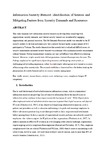Establishing an Information Security Awareness and Culture
| dc.contributor.supervisor | Furnell, Steven | |
| dc.contributor.author | Korovessis, Peter | |
| dc.contributor.other | School of Engineering, Computing and Mathematics | en_US |
| dc.date.accessioned | 2015-11-27T14:27:41Z | |
| dc.date.available | 2015-11-27T14:27:41Z | |
| dc.date.issued | 2015 | |
| dc.date.issued | 2015 | |
| dc.identifier | 10113162 | en_US |
| dc.identifier.uri | http://hdl.handle.net/10026.1/3836 | |
| dc.description.abstract |
In today’s business environment all business operations are enabled by technology. Its always on and connected nature has brought new business possibilities but at the same time has increased the number of potential threats. Information security has become an established discipline as more and more businesses realize its value. Many surveys have indicated the importance of protecting valuable information and an important aspect that must be addressed in this regard is information security awareness. The human component has been recognized to have an important role in information security since the only way to reduce security risks is through making employees more information security aware. This also means that employees take responsibility of their actions when dealing with information in their everyday activities. The research is concentrated mainly on information security concepts alongside their relation to the human factor with evidence that users remain susceptible to information security threats, thus illustrating the need for more effective user training in order to raise the level of security awareness. Two surveys were undertaken in order to investigate the potential of raising security awareness within existing education systems by measuring the level of security awareness amongst the online population. The surveys analyzed not only the awareness levels and needs of students during their study and their preparation towards entering the workforce, but also whether this awareness level changes as they progress in their studies. The results of both surveys established that the awareness level of students concerning information security concepts is not at a sufficient level for students entering university education and does not significantly change as they progress their academic life towards entering the workforce. In respect to this, the research proposes and develops the information security toolkit as a prototype awareness raising initiative. The research goes one step further by piloting and evaluating toolkit effectiveness. As an awareness raising method, the toolkit will be the basis for the general technology user to understand the challenges associated with secure use of information technology and help him assess its current knowledge, identify lacks and weaknesses and acquire the required knowledge in order to be competent and confident users of technology. | en_US |
| dc.description.sponsorship | The American College of Greece | en_US |
| dc.language.iso | en | en_US |
| dc.publisher | Plymouth University | en_US |
| dc.subject | Information Security Awareness | en_US |
| dc.subject | Information Security Culture | en_US |
| dc.subject | Information Security Surveys | en_US |
| dc.subject | Information Security Practices | en_US |
| dc.subject | Information Security Toolkit | en_US |
| dc.title | Establishing an Information Security Awareness and Culture | en_US |
| dc.type | Thesis | |
| plymouth.version | Full version | en_US |
| dc.identifier.doi | http://dx.doi.org/10.24382/4957 |
Files in this item
This item appears in the following Collection(s)
-
01 Research Theses Main Collection
Research Theses Main



